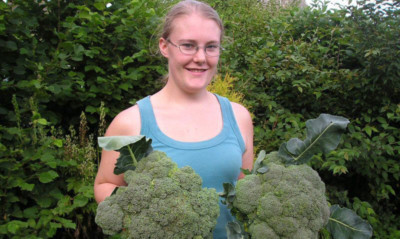Advertising watchdogs have forced a Perthshire charity to change its website over a single complaint about its celebrity-endorsed soil-enhancing product.
The SEER Centre Trust, which is based at Straloch Farm, near Pitlochry, was rapped by the Advertising Standards Agency (ASA) over claims made regarding SEER Rockdust.
The organisation promotes the ground volcanic rock as being beneficial to the soil and says is helps produce better crops. It is a favourite with celebrity gardeners Alan Titchmarsh and Alys Fowler and the charity says it has numerous fans worldwide.
But following a single challenge, which questioned whether the claims were misleading, the ASA ruled that the claims over the product could not be substantiated. In a written statement, the watchdog said the evidence supplied in support of the SEER (Sustainable Ecological Earth Regeneration) Centre’s claims was insufficient.
It stated: “The ASA considered that consumers would infer from that ad’s claims that the use of the SEER Rockdust in soil would boost soil fertility and produce stronger and healthier crops, which were less likely to fail than crops grown without SEER Rockdust or which had relied on other chemical fertilisers.
“We noted that the advertisers provided information about the effects of the mineralisation of soil, alongside documentation in support of the efficacy of the product.
“However, we considered that the papers, testimonials, references and photographs were not sufficient to support the claims, on the basis that they did not show clear and comparative results that the product would boost soil fertility and produce stronger and healthier crops or that the testing had been carried out under appropriate and robust conditions, which related to the product at hand.”
They also stated that academic reports were conflicting.
“We noted we had seen two studies which had considered the efficacy of the product in more detail,” it stated. “Although we acknowledged that one study stated that there were trends suggesting that there might be a benefit to applying rockdust to soil, we noted it also concluded that that premise had not been proven and that the evidence was inconclusive.
“We noted that another study carried out by Glasgow University also concluded that that SEER Rockdust could not be proven to be a useful soil fertility amendment.
“We noted the advertisers’ reservations regarding the quality of the soil in which that study was carried out, but considered that, to support the claims, the advertisers should provide documentation which showed that the product improved soil fertility and produce.
“Therefore, because we did not consider that we had seen sufficient substantiation to support the claims that the use of the SEER Rockdust in soil would boost soil fertility and produce stronger and healthier crops, we concluded that the claims were likely to mislead.”
Moira Thomson, co-founder of The SEER Centre Trust, said they were unaware they had been breaking any rules.
She said: “The charity was unaware that its claims about its results were not acceptable to the ASA until the complaint was made to ASA by an individual. We have complied fully with the ASA’s recommendations and we are updating the website following their guidance.
“The charity is non-commercial, it does not trade or advertise. The website is a vehicle for raising awareness about the benefits of soil remineralisation with mineral-rich crushed rock. The claims we have made about SEER Rockdust are a true record of the results we have achieved and duplicated over and over at the SEER Centre demonstration gardens over the last 17 years and which have been duplicated by satisfied users of the product in the UK and Europe.
“We have sufficient anecdotal evidence of the efficacy of rockdust in the SEER terraces to see, taste, smell and know that it has transformed the soil and vegetation here.
“It is unfortunate that the ASA do not consider our results or people’s testimonials as evidence. ASA requires independent, scientific, documentary evidence.”
